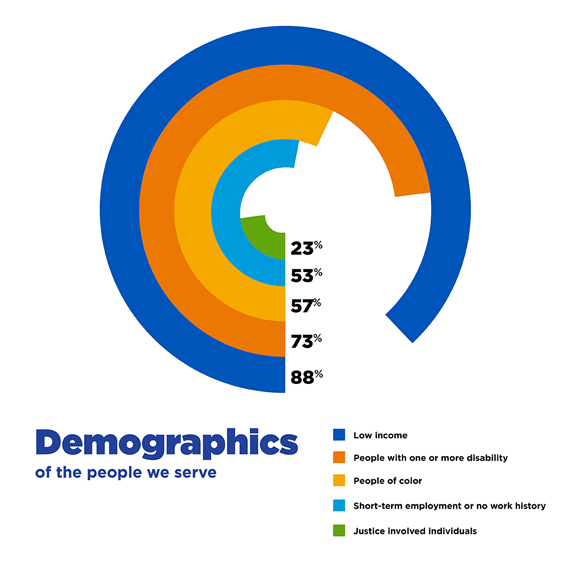Elizabeth’s Self-Advocacy Leads to Career Success
June 3, 2024
“I was adopted from Russia in 2004,” Elizabeth said. “There were specific challenges that I was going to have all throughout my life. Because of these challenges, it led to me needing someone to actively be there while I’m on the job or someone who I can actively talk to when it comes to specific issues at work.”
“The hardest part of what I go through is dealing with a disability that’s not physically visible, it’s mental, so I have to advocate for my disability verbally,” Elizabeth continued.
In high school, Elizabeth’s case manager referred her to Goodwill-Easter Seals Minnesota’s (GESMN) Supported Employment service because of her previous work experience.

“Before I was a part of the program, I didn’t disclose my disability, which made my job harder. When I couldn’t do something that my employer expected me to do, it may have come across as I didn’t want to work, or I was lazy.”
After Elizabeth got hurt on the job but was too embarrassed to tell someone, her case manager connected her with GESMN’s Supported Employment team to get on-the-job support and guidance.
“[GESMN’s Supported Employment service] has impacted me in a very positive way,” Elizabeth added. “I now know that disclosing your disability, doesn’t hurt you, it helps make your job easier at the end of the day.”
“I’ve learned how to communicate and how to advocate for myself. A big thing it helped me with is conflict resolution. By role playing, I figured out what to say, how to express my needs without offending someone and how to react appropriately,” Elizabeth said.
Elizabeth currently works at the YMCA in membership. “I’m normally answering phones, peoples’ questions about our programs and the YMCA itself. I also sign people up for gym memberships, take payments and help check people in,” Elizabeth added.
“My favorite part is being able to help people. I really like making a difference in peoples’ lives. I know it’s not something big, but being told you’re a great asset to the team or that you really helped a kid sign up for summer camp is something that’s nice to hear. It makes me happy to know that I’m having some type of impact on people, even if it’s something that small.”
“My current educational goal is getting my associate’s degree in psychology, which means I could continue working at the Y in the social service offices doing family visits. There are a lot more opportunities at the Y when I get my psychology degree,” Elizabeth said.
“Elizabeth has the tools within her and I’m grateful for having the opportunity to help her tap into the strengths she already has,” said Julian, Elizabeth’s career navigator. “Her self-advocacy and work ethnic are awesome. I’m proud of everything about her.”
“My biggest advice is to advocate for yourself,” Elizabeth advises others struggling to advance their careers because of a disability. “Don’t let anyone dictate how long you need a service or resource for. There’s no problem with you advocating because you need to consider what will make you better at work and help you accomplish your goals. A lot of people with disabilities don’t feel like their voices are being heard, so make sure you advocate your needs and not let someone else determine that for you.”
GESMN offers nearly 20 career and job training services to help people secure and retain employment. Each year GESMN serves over 5,500 Minnesotans and 73% of participants have one or more disabilities. Learn more about GESMN’s impact here.

Categories
